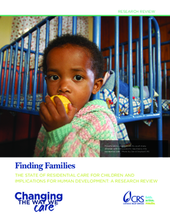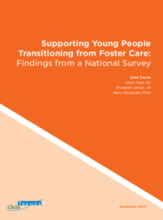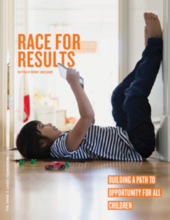This page contains documents and other resources related to children's care in the Americas. Browse resources by region, country, or category.
Displaying 1021 - 1030 of 1438
This review is a summary of the literature, from multiple disciplines, on residential child care and its deleterious effects on children.
Child Trends conducted a national survey of state independent living coordinators (Survey on Services and Supports for Young People Transitioning from Foster Care).
This study explores self-stigma in the utilization of mental health services while in foster care and whether the stigma developed while in foster care impacts mental health service use upon foster care exit.
This study sought to identify factors that contribute to the relational well-being of youth in substitute care.
Following up on a 2014 report of the same name, this report (Race for Results) describes the disproportionate barriers facing children of immigrant families in the US, and it recommends strategies that policy, community and civic leaders can use to guide their decisions so that all our children have a fair chance to thrive.
This chapter aims to discuss the methodological implications of research with children and adolescents who are living in foster care, with emphasis on the use of visual methods and reflexive interviews.
This study employed Concept Mapping (CM) with a convenience sample of 51 foster youth/alumni in one southeastern state in the US to explicate a conceptual framework for the development of campus supports for collegiate foster youth/alumni, and examine priority areas (e.g., importance and feasibility).
This chapter aims to present a research grounded in the bioecology of human development that analyzed shelter institutions through the perceptions of children aged from 7 to 12 years in Brazil.
This study investigated social capital, risk factors, and protective factors associated with the likelihood that youth in foster care will enroll in college.
This study contributes to the literature by examining risk and protective factors of chronic neglect.




